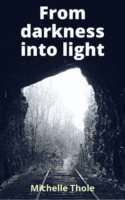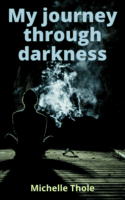On the 2nd of December 2011, my time had come. I had arrived at a house of one of my uncle’s from father’s side in Khayelitsha the evening before and had with me all I needed in a big bag. I could hardly sleep that last night before everything was to begin.
At 8 o’clock in the morning everybody was up and I was asked to undress. When I was naked, I had to take one of the newly bought blankets to wrap around me. This would be my only clothing for the coming days. Then the men walked with me to a place outside the yard which is called ubuhlathi, something like a kraal, a round meeting place which others can’t look into. The goat was brought and slaughtered and cut into pieces to be prepared for cooking. I was asked to sit in the centre of the kraal.
Suddenly another uncle came towards me with big scissors. I was not sure what his plan was. But my father looked relaxed, so I also pretended to be relaxed. Without any further word, the uncle started to cut all my hair until my head was bald and bleeding a bit. But I did not show any emotion. I knew that I would need to be strong, even stronger for what was still to come.
There was a break when the meat of the goat was ready. I had to eat one whole leg by myself. The rest of the meat was shared among the men and only one other leg and the intestines were given to the women. Then all the men started singing and drinking umqombothi African beer, and also brandy, which I was also allowed to drink for the first time. Some also started dancing, and it went on and on. I was also fed umvubo, mielie pap and sour milk, which helps to deal with the alcohol in your blood and works against possible infections. Mostly, I was just sitting on the ground and looking at everyone.
Late in the evening I was taken from the kraal to a backyard shack where I had to sleep alone. I fell asleep immediately after eating and drinking so much.
The next morning everybody was sleeping late. Some men had left. My father and others only allowed me to come out of my shack at about half an hour past noon. They guided me and other amakhwenkwe, other boys, to the area which was called the mountain, although it was not really a high mountain. I was given an intonga, a tall stick, which I had to carry in front of me. It reached up to my forehead. Every part of my body was covered with the blanket so I could only see through a small gap close to my eyes.
All the other boys on the mountain also had iintonga. We were all dancing and the men were singing a song called Somagwaza, reminding us of the old tradition of this ritual. Later we learnt that the song is about the first man ever circumcised who had such success with all women. When they started a song called Somdlanga ngalomdlanga, I knew the ritual would start soon as this was the song to announce the start of the ritual. I was told to follow my father to a nearby hut that was made of branches and wood and covered with a big plastic sheet.
When we entered the hut, the other boys and men were forming a circle and I was asked to sit in the centre of it. Then the ingcibi entered and came close to me. I recognized him as we had spoken and paid him and his assistant before.
“Open your blanket and then spread your legs wide!” he told me without further introduction. I did as I was told. He took off his isidlokolo, a hat made of bull skin. Then I saw in his hand the umdlanga, a small spear which is sharp on both sides. I knew the moment had come!
Without further warning, he started pulling carefully on my foreskin with one hand – and then he cut my skin off with one quick move with the umdlanga in his other hand. I did not scream or make even the smallest move myself, although I felt the shock of a burning pain. I knew I had to be a man now – able able to carry pain without showing it.
After the ritual I was guided back to another hut with other initiates. My father gave me another blanket so I had one to put on the ground to sit and sleep on and the second one to put around me and keep me warm. The last words my father spoke on this special day were.
“I am proud of you, my son. I will only come back in eight days. You have to heal and to let the spirit of manhood come into you.”
* * *
Again we were advised to smear our legs and upper bodies with ingceke, the white clay mixed with water. This we had to repeat every day from now on. A hard time started. My half-brother Andile brought some kind of food every day, but it was only pap, no meat, no salt, no bread… and worse, no water. Did you ever spend a whole day without drinking anything? Imagine eight days!
On the third day I started to feel the full power of the pain which spread all over my body. The ikhankatha brought some isicwe, a green plant which grows everywhere in the veld to help heal the wound more quickly. But still the pain was there.
It was not easy to remain calm and not to cry out loudly. I kept saying to myself, I have to stand my ground… nobody else is crying. I will also not cry or show any sign of weakness! To be honest, I could hardly sleep through any of those nights.
The worst in the end was the lack of water for drinking, but also for washing. My lips broke open because of the thirst and I started stinking from my own body. Also the hut started smelling, as I was not allowed to go outside. I had to pee on the ground when I could hold it no longer.
Finally, finally, on the eighth day, my father and another man returned. It was the afternoon of the eighth day. I had to take off all bandages. The wound had healed well. A big smile appeared on my father’s face:
“You healed so well, Mbu, you are a man now. People must call you buthi from today out of respect!”
I was allowed to go out of the hut and to meet the abakhwetha, the other initiates. All of us were in a celebratory mood… wow, we made it! And from now on we were allowed to eat everything and to even have cool drinks. I could hardly stop drinking and, in fact, drank so much that I had a tummy ache afterwards. But this was nothing compared to the longing for just water all those days before.
We were then led to a river and next to a dam we could wash ourselves. This time others oiled my body, my skin was gleaming and my face and lips felt so soft again. I was given a new clean blanket and a new stick and all the old stuff from the hut was burnt in a fire. When we walked back to the home in Khayelitsha everybody welcomed us with such joy. Family and neighbours were singing and dancing. The umgidi had started: the celebration to welcome us back in the community as men.
* * *
Despite the long party the day before, the next morning everybody was up early. A lot of food was prepared to welcome the wider family.
A wonderful surprise was when a bit later the same morning, a grey minibus and a green car parked in front of our yard. Out jumped most of the kids from the HOKISA Children’s Home and some childcare workers who all came to congratulate me. As a director, Mama Robyn was dressed in a traditional African skirt which I had never seen on her before. Doc Lutz also came.
Believe it or not they had even brought my mother who was sober and also so glad to see me. Although she and my father had no relations anymore, she was treated with respect by my father’s family and I sat next to her while we were all eating umgusho, goat meat with pap and drinking beer or cool drinks.
As a present my friends from HOKISA had brought me more new clothes which I could not wait to wear. But not yet, I still had to finish all rituals properly, mainly to thank the ancestors that everything went so well. Everyone left later that day to go back to Masiphumelele, but it was a joyful good-bye as I knew we would see each other soon again. I would come back as bhuti then – sobonana, abantwana!
I will never forget that day, 3rd of December 2011. The day I was circumcised and became indoda.
The End




